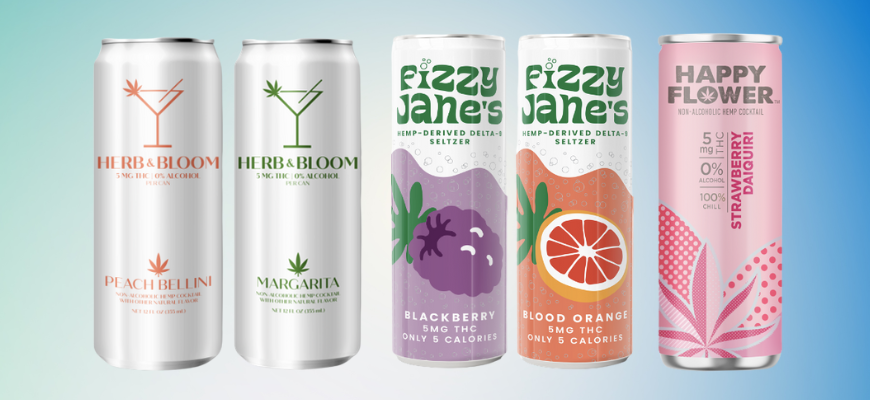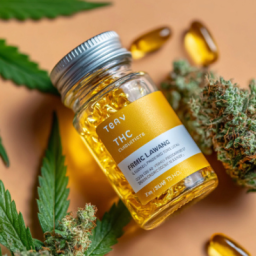
Tilray’s Bold Expansion into THC-Infused Beverages
Tilray Brands—a company traditionally known for its cannabis, craft beer, and wellness portfolios—launched an ambitious new product line: hemp-derived Delta-9 THC beverages. These beverages include non-alcoholic cocktails, sparkling seltzers, and canned wellness drinks infused with federally legal hemp-derived THC, leveraging the 2018 Farm Bill’s allowance of up to 0.3% THC on a dry weight basis.
With this move, Tilray is positioning itself as a first-mover in the intoxicating hemp beverage market. According to Food Dive, the company has already distributed these products to over 1,000 retail locations across the U.S., using its extensive craft beer and alcohol distribution network to accelerate entry into mainstream grocery and convenience stores. Tilray’s CEO Irwin Simon described this strategy as “the logical evolution of our beverage portfolio,” emphasizing that hemp-based THC drinks complement both its wellness and adult-use offerings.
Tilray’s 2024 financial reports revealed that while cannabis sales in Canada and Europe have slowed, U.S. hemp-derived THC beverages have become a high-growth category, projected to generate $750 million in sales by 2029. This growth reflects not only consumer appetite for low-dose THC experiences but also Tilray’s unique licensing and distribution model that sidesteps the fragmented cannabis dispensary system.
Protecting IP in Beverage Licensing: Branding and Formulation Safeguards
How Do You Protect Hemp Beverage Formulas in Licensing Deals?
When licensing products like hemp-derived THC beverages, business owners must secure their brand and formulation rights. This requires a carefully drafted intellectual property licensing strategy that covers:
- Trade Secrets and Patents: Proprietary formulas, emulsification processes, and cannabinoid delivery methods should be protected as trade secrets or patented where applicable. License agreements should explicitly state whether these are shared, sublicensed, or remain confidential.
- Trademarks: Brand names, logos, packaging designs, and slogans (such as Tilray’s craft-beverage brands like SweetWater or Breckenridge) must be protected via U.S. and international trademark registrations. Licensing should outline proper use of the marks and establish quality control provisions to prevent brand dilution.
- Sublicensing and Co-Packing: Beverage companies often sublicense manufacturing rights to co-packers or distributors. Contracts must clarify who can produce the product, in what volumes, and under what quality standards.
- Cross-Border Licensing: For Canadian companies like Tilray operating in the U.S., licensing agreements must address dual compliance—balancing Canadian medical/recreational cannabis rules with U.S. hemp-derived cannabinoid regulations. This includes export restrictions, product registration, and local labeling requirements.
Structuring License Agreements for Hemp-Derived THC Beverages
What Should Be Included in a Hemp-THC Beverage Licensing Agreement?
Licensing hemp-derived THC beverages requires more than standard beverage licensing terms. The following elements are critical:
1. Clear Product Scope
Specify whether the license covers:
- Hemp-derived Delta-9 THC only
- Other cannabinoids (CBD, CBG, CBN, Delta-8)
- Infused beverage formats (seltzers, shots, teas, mocktails)
Define cannabinoid content per serving, methods of infusion, and any future formulation rights.
2. Territory and Channel Exclusivity
Tilray leverages alcohol distributor partnerships to enter retail markets without going through dispensaries. License agreements must clarify:
- Exclusive vs. non-exclusive rights by geography (state-by-state)
- Sales channels (e.g., grocery vs. online)
- Carve-outs for restricted markets such as California or New Jersey, where state bans may apply
3. Compliance with the 2018 Farm Bill
The license must require:
- Verified compliance with federal hemp standards (no more than 0.3% Delta-9 THC on a dry weight basis)
- Third-party lab testing and certificates of analysis
- Age-restricted sales protocols (21+ labeling and verification)
Including these provisions protects the brand owner from distributor or partner missteps that could lead to regulatory enforcement.
Navigating Regulatory Shifts: Building Flexibility into Licensing
How Can Brands Protect Themselves from Regulatory Risks?
Cannabis and hemp beverage regulations are evolving rapidly. Tilray’s licensing structure likely includes regulatory flexibility provisions, and brand owners should follow suit. Here’s how:
1. Regulatory Change Clauses
Include provisions that allow:
- Contract renegotiation or termination if federal or state laws change
- Suspension of distribution in banned jurisdictions
- Automatic adjustment of royalties or pricing in response to new compliance costs
2. Risk-Sharing for State Bans
Given the risk of state-level crackdowns (e.g., California’s proposed hemp beverage restrictions), licenses should:
- Allocate unsold inventory risks
- Set guidelines for safe product recalls or destruction
- Require indemnification by distributors for violations
3. Harmonizing Labeling Under FDA and DSHEA
Beverage products must comply with:
- FDA guidelines for food and beverage labeling
- DSHEA (Dietary Supplement Health and Education Act) if wellness claims are made
- State-specific warnings, such as California’s Prop 65 for THC
License agreements should require co-packers and retailers to follow unified, pre-approved label templates and update them when regulations change.
Key Takeaways for Business Owners
Tilray’s foray into hemp-derived THC beverages represents more than just a product launch—it’s a licensing case study. Business owners considering similar ventures should:
- Protect proprietary formulations and brand IP
- Use licensing to control manufacturing, distribution, and brand standards
- Build agreements that flex with regulatory changes
- Ensure compliance with U.S. and cross-border cannabis and hemp laws
Frequently Asked Questions
Question 1: Can any company launch a hemp-derived THC beverage?
Answer: Yes, but they must comply with the 2018 Farm Bill, federal FDA guidelines, and state-specific regulations. A strong licensing agreement is essential to mitigate risks.
Question 2: What happens if a state bans THC beverages after a license is signed?
Answer: Well-drafted agreements include regulatory change clauses that allow for contract adjustment, suspension, or termination if laws shift.
Question 3: How do you protect beverage formulations in a licensing deal?
Answer: Protect proprietary formulas through trade secrets, NDAs, and license terms that restrict use, sublicensing, and disclosure.
Question 4: How can beverage brands ensure quality control when licensing THC products?
Answer: Licensing agreements should include detailed manufacturing specifications, batch testing requirements, and approval rights over packaging and marketing. Establishing standard operating procedures and regular audits can help maintain brand integrity and compliance.
Question 5: What is the difference between licensing for hemp-derived THC products and traditional food & beverage licensing?
Answer: Hemp-derived THC licensing involves additional layers of regulatory compliance, including cannabinoid content limits, age restrictions, and state-by-state legal variability. Traditional food & beverage licensing typically focuses on recipe control, branding, and distribution channels without the same regulatory volatility.
Conclusion: Strategic Takeaways for Business Owners and Licensors
Tilray’s expansion into hemp-derived THC beverages is a prime example of how licensing can be a growth engine—but only when paired with robust legal protections and agile deal structures. For business owners and licensors, now is the time to rethink licensing frameworks to ensure that brand identity, proprietary formulations, and distribution rights are properly safeguarded in this emerging category.
If you’re considering entering the cannabinoid beverage space—or revising your current licensing model—our team at Juris Law Group can help you draft, review, and negotiate agreements that align with your business goals while anticipating the legal complexities of this evolving market. Contact us today to schedule a consultation and ensure your licensing strategy is as innovative as your products.





